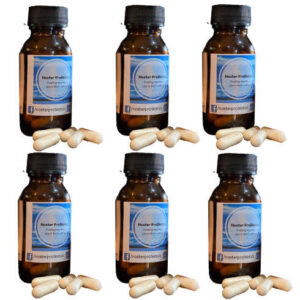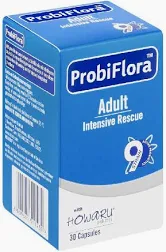Differences between Live and Regular Probiotics
Introduction
Looking to dive into the world of probiotics?
Curious about the differences between live and regular probiotics?
Well, you’ve come to the right place! In this blog post, we’ll explore the contrasting characteristics of live and regular probiotics, helping you make an informed choice for your health and wellness journey. So grab a cup of your favourite fermented drink and let’s embark on this probiotic adventure together!
What are probiotics?
Importance of probiotics for health
Probiotics are live bacteria and yeasts that are beneficial for our health, particularly our digestive system. These friendly microorganisms promote a healthy balance of gut bacteria, which plays a vital role in digestion, nutrient absorption, and immune function. Incorporating probiotics into our daily routine can help maintain a healthy gut microbiome and support overall well-being. So, let’s delve deeper into the importance of probiotics for our health and explore their potential benefits.
Probiotics can aid in the prevention and treatment of various gastrointestinal conditions such as diarrhoea, irritable bowel syndrome (IBS), and inflammatory bowel disease (IBD). They can also help alleviate symptoms of lactose intolerance and reduce the risk of developing certain allergies. Additionally, probiotics have shown promise in boosting immune function and reducing the risk of respiratory infections. With these potential benefits in mind, it is clear that incorporating probiotics into our diet can have a positive impact on our overall health and well-being. So, whether you choose live or regular probiotics, rest assured that you are taking a proactive step towards supporting your digestive health and enhancing your overall quality of life.
Live Probiotics
Definition and characteristics
Live probiotics are defined as strains of beneficial bacteria that are still alive and active when consumed. These probiotics are typically found in fermented foods like yoghurt, kefir, sauerkraut, and kimchi. Noster ProBiotics is one of the few commercial probiotics that come as a live culture. They are known for their ability to colonize the gut and provide various health benefits, such as improved digestion, enhanced immune function, and reduced inflammation. Live probiotics contain a diverse range of bacterial strains, each with its unique benefits, making them a popular choice for those seeking to optimize their gut health.
Live probiotics refer to beneficial bacteria strains that remain alive and active when ingested. These probiotics are commonly found in fermented foods such as yoghurt, kefir, sauerkraut, and kimchi. Noster ProBiotics stands out as a commercial option that provides live cultures. They are recognized for their capacity to establish themselves in the gut and offer numerous health advantages, including better digestion, enhanced immune function, and decreased inflammation. Live probiotics encompass a wide array of bacterial strains, each with its distinct benefits, making them a preferred option for individuals aiming to optimize their gut health.
Benefits of live probiotics
1. Enhanced potency
Live probiotics have enhanced potency due to their ability to survive the harsh acidic environment of the stomach and reach the intestines alive, where they can exert their beneficial effects.
2. Improved digestion
Live probiotics promote improved digestion by aiding in the breakdown and absorption of nutrients, reducing symptoms of bloating, gas, and indigestion.
3. Strengthened immune system
Consuming live probiotics can support a healthy immune system by stimulating the production of immune cells and enhancing their functionality.
4. Reduced inflammation
Live probiotics have been shown to have anti-inflammatory properties, helping to reduce inflammation in the gut and throughout the body.
5. Balanced gut microbiome
By introducing diverse strains of beneficial bacteria, live probiotics help to restore and maintain a balanced gut microbiome, which is essential for overall health and well-being.
2. Improved gut colonization
Live probiotics can colonize the gut and establish a thriving community of beneficial bacteria, which can contribute to optimal digestive function and overall gut health.
3. Active restoration of gut microbiota
Consuming live probiotics actively restores and replenishes the gut microbiota, promoting a diverse and thriving community of beneficial bacteria in the digestive system.
1. Enhanced nutrient absorption
Live probiotics support enhanced nutrient absorption by improving the breakdown and digestion of food, allowing the body to extract maximum nutritional value from the diet.
2. Strengthened immune system
Through their interactions with the gut microbiota, live probiotics play a crucial role in supporting a healthy immune system, helping to defend against pathogens and reduce the risk of infections.
Best sources of live probiotics
- Fermented foods like yoghurt, sauerkraut, and kefir are excellent sources of live probiotics.
- Probiotic supplements that contain a variety of strains and high colony-forming units (CFUs) can provide a concentrated dose of live probiotics.
- Some specific strains of bacteria, such as Lactobacillus acidophilus and Bifidobacterium bifidum, are commonly found in probiotic products and can offer beneficial live probiotics.
- Consuming foods that naturally contain live cultures, such as kombucha and miso, can also provide a source of live probiotics.
- When selecting probiotic products, look for those that are labelled as containing “live and active cultures” to ensure you’re getting viable probiotics. This would be Noster ProBiotics, one of the few commercial live-strain probiotic cultures available.
Regular Probiotics
Definition and Characteristics
Regular probiotics refer to commercially available probiotic supplements or food products that contain specific strains of beneficial bacteria. These products undergo a manufacturing process, such as freeze drying, to ensure the viability and stability of the live probiotics until consumed. Regular probiotics typically contain strains such as Lactobacillus and Bifidobacterium, which have been extensively studied for their potential health benefits. These strains are selected based on their ability to survive the harsh conditions of the digestive system and adhere to the intestinal lining, allowing them to exert their positive effects on gut health and overall well-being.
Benefits of regular probiotics
1. Convenient and easy to use
Regular probiotics are convenient and easy to use, as they are available in various forms such as capsules, tablets, powders, and even in certain food products. This allows individuals to incorporate them seamlessly into their daily routine without much effort. Additionally, regular probiotics often come in pre-determined doses, making it simple to follow the recommended intake guidelines for optimal benefits.
2. Longer shelf life
Regular probiotics have a longer shelf life compared to other perishable health supplements. This is because they are specifically formulated to contain live and viable strains of bacteria that can survive for extended periods without compromising their effectiveness. The longer shelf life ensures that individuals can stock up on probiotics and have a constant supply without worrying about them expiring or losing their potency.
3. Wide availability
Regular probiotics are widely available in pharmacies, supermarkets, health food stores, and online retailers, making them easily accessible to the general public. This wide availability ensures that individuals can easily find and purchase probiotics whenever they need them, without any significant barriers or limitations. Whether someone lives in a rural area or a bustling city, they can typically find regular probiotics without much difficulty. This widespread availability also allows for a variety of options and brands to choose from, catering to different preferences and needs.
Limitations of Regular Probiotics
1. Survivability and Viability:
-
Stomach Acidity: One significant limitation of regular probiotics is their vulnerability to stomach acid. Many probiotic strains struggle to survive the acidic environment of the stomach, reducing their effectiveness when they reach the gut.
-
Variable Survival: Different strains have varying degrees of acid resistance, and individual factors like diet and medication can influence survival rates. This variability can make it challenging to predict the probiotics’ efficacy.
2. Strain Specificity:
-
Tailored Solutions: Regular probiotics may not address specific health concerns as effectively as strain-specific probiotics. Some health issues require precise strains that might not be present in common probiotic blends.
-
Limited Diversity: Regular probiotics often contain a limited variety of strains compared to the diverse ecosystem of the gut microbiome. This lack of diversity may not fully support overall gut health.
3. Short-Term Effects:
-
Temporary Colonization: The effects of regular probiotics are typically transient. When you stop taking them, the introduced strains may gradually diminish in numbers within the gut, potentially leading to a loss of benefits.
-
Need for Continuous Use: To maintain their benefits, you may need to take regular probiotics continuously, which can be costly and inconvenient.
4. Individual Variability:
- Response Variations: People’s responses to regular probiotics can vary widely. What works for one individual may not be as effective for another due to differences in gut microbiota and overall health.
5. Safety Concerns:
-
Immunocompromised Individuals: Regular probiotics may not be suitable for individuals with compromised immune systems, as there is a risk of harmful bacteria or yeasts proliferating in the gut.
-
Potential Side Effects: Some individuals may experience gas, bloating, or digestive discomfort when taking regular probiotics, especially at the beginning of supplementation.
6. Limited Regulation:
- Quality Control: The probiotic industry is not uniformly regulated, which means the quality and potency of products can vary between brands. This lack of regulation makes it essential to choose reputable brands and products.
7. Bioavailability:
- Bioavailability Issues: Even if probiotics survive the digestive process, their bioavailability (the ability to be absorbed and utilized by the body) can be limited. This means that not all beneficial components of probiotics may reach their intended targets.
8. Health Claims:
- Limited Approved Health Claims: In many regions, including the European Union, only a few specific health claims for probiotics have been approved. This can make it challenging to assess the potential benefits accurately.
It’s important to note that while regular probiotics have their limitations, they can still provide valuable support for digestive health and overall well-being for many individuals. However, understanding these limitations can help you make informed decisions about when and how to use regular probiotics, as well as when to consider more targeted probiotic solutions. Always consult with a healthcare professional for personalized guidance.
Choosing the Right Probiotics for You, Between Live and Regular Probiotics
Considerations for live probiotics
1. Storage and handling requirements
-
Live probiotics require specific storage and handling requirements to maintain their effectiveness. These requirements may include refrigeration or protection from excessive heat or humidity.
-
It is important to carefully read and follow the instructions provided by the manufacturer to ensure that the live probiotics are stored and handled correctly.
-
Failure to properly store or handle live probiotics can result in a decrease in their potency and effectiveness.
-
Some live probiotics may also have a shorter shelf life compared to regular probiotics, requiring individuals to use them within a specific timeframe.
-
Additionally, live probiotics may need to be consumed within a certain period after opening to ensure their maximum benefits.
2. Probiotic strain selection
When selecting a probiotic strain, it’s essential to consider the specific health benefits you’re targeting. Here are a few popular probiotic strains and their associated benefits:
- Lactobacillus acidophilus: Supports digestive health and boosts the immune system.
- Bifidobacterium bifidum: Aids in the breakdown of complex carbohydrates and supports a healthy gut.
- Lactobacillus rhamnosus: Helps prevent and treat diarrhoea, especially in children.
- Saccharomyces boulardii: Helps restore gut flora balance and is effective against antibiotic-associated diarrhoea.
- Streptococcus thermophilus: Assists in lactose digestion and improves lactose intolerance symptoms.
- Lactobacillus sporogenes / Bacillus coagulans: Can resist stomach acid and easily travel to the small intestine.
- Lactobacillus casei: Treats diarrhoea, infectious and irritable.
- Lactobacillus paracasei: Autoimmune diseases such as lactose intolerance and others.
- Lactobacillus plantarum: Prevents pathogenic bacteria from attaching to the stomach wall.
Remember to consult with a healthcare professional to determine which probiotic strain is best suited for your specific needs.
1. Quality and Potency of Regular Probiotics
When it comes to incorporating regular probiotics into your daily routine, the quality and potency of the probiotic supplements you choose are paramount. Here’s why it matters:
Quality Assurance:
- Strain Authenticity: Ensure that the product contains the specific probiotic strains listed on the label. Authenticity guarantees you are getting the intended health benefits.
- Purity: Look for probiotics that are free from contaminants, additives, or fillers that could compromise their effectiveness.
Potency:
- Colony Forming Units (CFUs): The CFU count indicates the number of live probiotic bacteria in each serving. Higher CFU can be more effective, especially for specific health concerns.
- Stability: Check if the product is shelf-stable, meaning it retains its potency without the need for refrigeration. This can be crucial for convenience and effectiveness.
Third-Party Testing:
- Independent Verification: Consider products that undergo third-party testing to confirm their quality and potency. This extra layer of verification ensures transparency and reliability.
Expiry Dates:
- Freshness Matters: Always check the expiration date on the packaging. Consuming probiotics past their expiry date may not provide the desired health benefits.
2. Product Formulation and Packaging
The formulation and packaging of regular probiotics can significantly impact their efficacy and convenience:
Strain Selection:
- Tailored to Needs: Look for products with probiotic strains that align with your specific health goals. For instance, if you’re seeking digestive support, choose strains known for their digestive benefits.
Packaging:
- Protective Packaging: Opt for probiotics that come in opaque, airtight containers to shield the live bacteria from moisture, light, and air, which can compromise their viability.
Prebiotics and Synbiotics:
- Enhanced Formulations: Consider probiotics that include prebiotics (food for probiotics) or synbiotics (a combination of prebiotics and probiotics). These formulations can promote the survival and growth of beneficial bacteria in the gut.
Dosage and Administration:
- Convenient Dosage: Choose products with dosage recommendations that fit your lifestyle and preferences. Some come in convenient daily capsules, while others may be in powder or liquid form.
Specialized Formulations:
- Targeted Solutions: Depending on your health needs, explore probiotics formulated for specific purposes, such as women’s health, immune support, or post-antibiotic recovery.
Conclusion
Final thoughts on live and regular probiotics
In conclusion, when it comes to live and regular probiotics, the benefits of live probiotics simply cannot be ignored.
They offer a higher potency and greater effectiveness in promoting gut health and overall well-being.
So, if you’re a health enthusiast looking to optimize your digestive system and enhance your immune function, live probiotics are the way to go.
Cheers to a healthier gut and a happier you!

